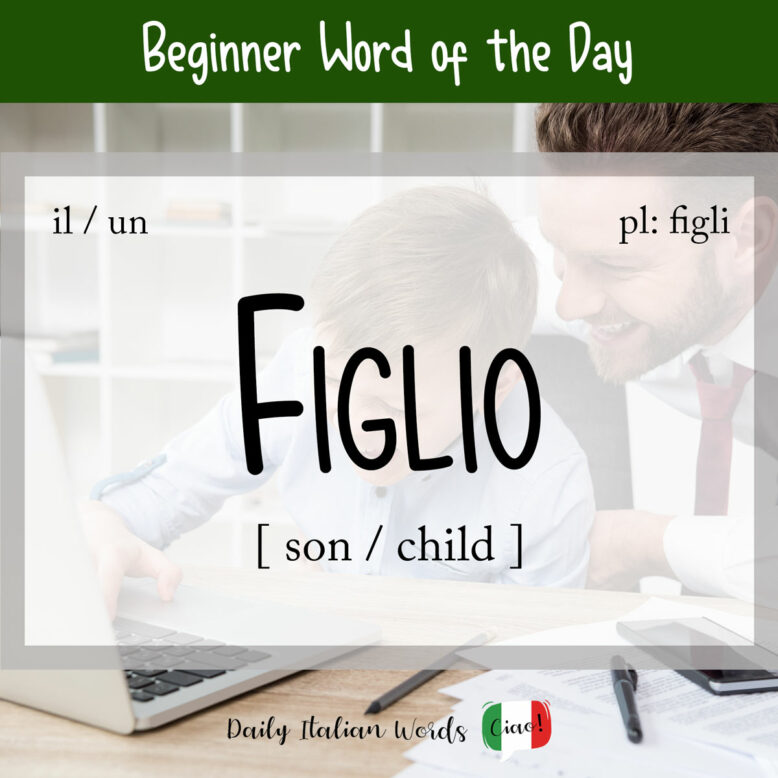Figlio is the word for son in Italian. It derives from the Latin filius and is related to words such as femmina (female) and fecondo (fertile). It can also refer more generically to a child if the sex is unknown (as in the case of an unborn child for example).

The plural figli can mean either sons when talking about multiple male children or children when talking about a mixed group of sons and daughters. The feminine equivalent figlia (plural: figlie) is the word for daughter.
Nonostante io abbia sette figlie e un figlio, voglio bene a tutti i miei figli allo stesso modo.
Although I have seven daughters and one son, I love all my children equally.

Some different kinds of figli include:
- figlio unico = only child
- figlio naturale = natural-born son
- figlio adottivo = adoptive son
- figlio illegittimo = illegitimate son
- figlio dell’amore = love child
- figlio della provetta = test tube baby
- Figlio di Dio = The Son of God
- Figliol / figliuol prodigo = prodigal son (in this case figliol and figliuol = figliolo, a more affectionate term for son)
By extension, figlio can also function as a term of endearment, used by an older man towards a boy or young man. It is similar to the familiar forms of address my (dear) boy, son or sonny in English and is more or less interchangeable with the affectionate term figliolo.
Beh figlio mio, la vita è piena di ostacoli, ma non ti devi arrendere!
Well my boy, life is full of obstacles, but you must not give up!
Just as in English, figlio/a can be used for a person you care for even if you are not related to him or her:
- Gli voglio bene come un figlio. = I love him like a son.
- Il maestro ci tratta sempre come figli. = The teacher treats us as if we were his children.
Similarly, it can also be an informal term for a man (uomo), with the best translations being fellow, lad or chap.
Ha passato tre mesi in carcere ed era pure innocente, povero figlio!
He spent three months in prison and he was innocent, poor fellow!
In a figurative sense, figlio can describe someone who is the product of the context from which they derive. A few commonly used examples include:
- figlio d’arte = an artist who comes from an artistic family (lit: son of art)
- figlio dei fiori = hippy (lit: son of the flowers)
- figlio del proprio tempo = the product of one’s time
- figlio del popolo = child of humble origins (lit. son of the people)

Figlio di papà (lit: son of dad) refers to a young man who leads a comfortable life or lives by benefiting from the economic or social position of his father, whereas figlio di mamma (lit: son of mother) is a weak man who is dependent on his mother despite being an adult.
A figlio di nessuno (lit. son of no one) means orphan, or a child who is neglected by his parents. Similarly, a figlio della strada (lit. son of the street) is a child who grows up alone on the streets. A figlio della serva (lit. son of the servant) is a person who nobody pays attention to.
Below are a few common verbs you’ll often see used with figlio:
- aspettare un figlio = to be expecting (a child / baby)
- tirare su i figli = to raise children
- avere / fare un figlio = to have a child
Vuole fare un figlio prima di compiere quarant’anni.
She wants to have a child before she turns forty.

If you attend an Italian wedding, you may well hear one of the guests shout out << Auguri e figli maschi! >> which means << Best wishes and may your offspring be male! >> Although it is now said in jest, the undertones were probably more serious at a time when sons were in charge of working and bringing money home to the family, and daughters remained at home until marriage.
Finally, we have the somewhat offensive expression figlio di buona donna (lit: son of a good woman) which is a general exclamation of contempt. Unsurprisingly, buona donna can be replaced with various vulgar terms that translate as prostitute. By doing so, you can turn the expression into an insult.
Heather Broster is a graduate with honours in linguistics from the University of Western Ontario. She is an aspiring polyglot, proficient in English and Italian, as well as Japanese, Welsh, and French to varying degrees of fluency. Originally from Toronto, Heather has resided in various countries, notably Italy for a period of six years. Her primary focus lies in the fields of language acquisition, education, and bilingual instruction.


